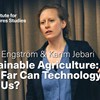veridical

Patricia Mindus and Rebecca Stern: Juridical Time and Its Role in Migration Law
In Sweden and other countries, a clear trend in migration law in recent years has been a shift from permanent towards temporary: time-limited residence permits, revocation of refugee status, higher th
Patricia Mindus and Rebecca Stern: Juridical Time and Its Role in Migration Law - A Focus on Sweden
Venue: Holländargatan 13, Stockholm, or online. Research seminar with Patricia Mindus and Rebecca Stern. Patricia Mindus is Professor in Practical Philosophy at Uppsala University. Her research mainly f
Does semantic information need to be truthful?
Synthese 196(7): 2885–2906. doi.org/10.1007/s11229-017-1587-5 Abstract The concept of information has well-known difficulties. Among the many issues that have been discussed is the alethic nature of a se
David Ellerman: Reframing the Labor Question
On Marginal Productivity Theory and the Labor Theory of Property. David Ellerman, Visiting scholar at the University of California in Riverside ABSTRACT Neoclassical economics uses the perfectly competit

The Black Beach: Moving Images between Swedish and Caribbean Shores
How can we understand life on the former Swedish Caribbean colony Saint-Barthélemy? This project aims to add to our undestanding using artistic methods as a complement to the juridical documents available in archives.
Regulating high-reach AI: On transparency directions in the Digital Services Act
Internet policy review, vol. 13:1 Abstract By introducing the concept of high-reach AI, this paper focuses on AI systems whose widespread use may generate significant risks for both individuals and soci
Potential Institutions for Future Generations: What Do Current Generations Think?
Results from a Six-Country Public Opinion Survey 32 s. Summary Policymakers, civil society organizations, and academics are proposing the establishment of new institutions for better representing the rig

Karim Jebari & Emma Engström: Sustainable Agriculture - How Far Can Technology Take Us?
What would it take to have a sustainable world by the year 2100? In their research, philosopher Karim Jebari, and Emma Engström, PhD in technology, have analyzed a large set of potentially disruptive
Future of food: A technology-centered path towards sustainable production in 2100
Futures, vol. 167 Abstract We stipulate a normatively desirable scenario for food production in 2100 and formulate a specific technology-centered path to reach it. In this scenario, the human population
Gender essentialism makes segregation persistent
Socially constructed beliefs about biological gender differences, i.e. gender essentialism, can to a large extent explain the remaining gender segregation and inequality. That’s one of the conclusions








